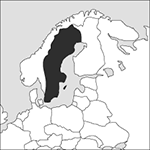
Source: MAPS IN MINUTES™ © RH Publications (1997)
Capital:
Stockholm
Area:
450,295 sq km (173,860 sq miles)
Population:
9,119,423 (2005)
Currency:
1 Swedish krona = 100 ore
Religions:
Lutheran 87.0%
Ethnic Groups:
Swedish; Finnish, Lapp, and other minorities
Languages:
Swedish (official); minority languages
International Organizations:
UN; EU; Council of Europe; OSCE; OECD; Euro-Atlantic Partnership Council; WTO
A country in northern Europe occupying the southern and eastern (the largest) part of the Scandinavian peninsula.
Physical
Sweden has a lengthy mountainous boundary with Norway on the north-west and a shorter one with Finland on the north-east. Its island-fringed coasts are on the Baltic Sea and the Kattegat, the channel to the North Sea. The northern part of the country is within the Arctic Circle. There are glaciers in the mountains, which are heavily forested with conifers. Parallel rivers fall to the Baltic Sea (Gulf of Bothnia) in rapids and falls, many of which have hydroelectric power stations. A region of hills and huge lakes lies to the south of the mountain range, and then the land rises again to a rocky, forested plateau. The southern coastal plain is extremely fertile.
Economy
Sweden has an industrial economy based on the exploitation of abundant natural and mineral resources. Major exports include machinery, motor vehicles, paper, iron, and steel. A leading producer of iron ore, the country also has deposits of copper, lead, and zinc. Commercial forestry is important. Electricity is generated mainly from nuclear and hydroelectric sources. The small agricultural sector produces cereals, sugar beet, meat, and milk.
History
The country’s earliest history is shrouded in legend, but Suiones tribesmen are mentioned by Tacitus and were probably the founders of the first unified Swedish state. Swedish Vikings were active in the Baltic area, and also ventured into Russia and the Arab caliphate of Baghdad. Christianity was introduced in the 9th century but the population was not converted until much later. In the 13th century parts of Finland and Karelia were occupied, but from 1397–1523 Sweden belonged to the Danish-dominated Union of Kalmar. Gustavus Vasa led the revolt that ended in independence for Sweden, a national crown for himself and his dynasty, and the introduction of the Lutheran Church as the state religion. During the 16th and 17th centuries Sweden expanded territorially and achieved considerable political status, thanks largely to the efforts of Gustavus II (Adolphus) and Axel Oxenstierna. The high point was reached after the Treaty of Westphalia, during the reign of Charles X (1654–60), but the strains of maintaining a scattered empire began to tell during the reign of Charles XII (1682–1718). After the Northern War (1700–21) the empire was dismembered and parliamentary government prevailed until the coup of Gustavus III in 1771 who remained in power until 1792.
During the Napoleonic Wars Sweden joined the Third Coalition against France (1805), but France defeated Russia, and the latter in turn took Finland from Sweden as compensation (1809). In that year the pro-French party in the Swedish estates overthrew the existing monarch, Gustav IV, and elected the aged and childless Charles XIII (1809–18). In 1810 they invited Jean-Baptiste Bernadotte to become crown prince. He subsequently ruled as Charles XIV (1818–44), and his descendants have remained monarchs of Sweden ever since. From 1814–1905 Norway was united with Sweden. Pursuing a policy of non-alignment, Sweden kept out of both World Wars, and by the 1950s it had developed into one of the world’s wealthiest and most socially progressive states with an extensive social welfare system. A long Social Democrat hegemony was challenged during the 1970s, but regained by Olof Palme (1982–86), until his assassination. Sweden has played a central role in UN peacekeeping missions. It hosted the conference in 1959 resulting in EFTA, but in 1991 it applied to join the European Community and became a member of the European Union in 1995. The Moderate Unity Party under Carl Bildt came to power in 1991, committed to reduction in public expenditure on welfare provision. Social Democrat leader Ingvar Carlsson, who had succeeded Olof Palme as Prime Minister in 1986, regained power in 1994, but handed over power to Göran Persson in 1996. After elections in 1998 and 2002 further coalitions, led by the Social Democrats, were formed; but in 2006 a four-party centre-right coalition triumphed and Frederik Reinfeldt became Prime Minister. This coalition continued in power after the 2010 election as a minority government. In 2014, a minority Social Democrat–Green coalition came to power under Stefan Löfven. It was soon challenged by the massive increase in migrant numbers in 2015 which resulted in the reluctant imposition of border controls and other restrictions. The influx of refugees has led to a rise in the popularity of far-right parties.
- thrashing
- Thrasymachus (430–400)
- thread
- thread bump
- thread cell
- threaded list
- threading
- threat
- threat display
- threatened species
- three-address instruction
- three-axis stabilization
- three-body problem
- three-cell model
- three-colour photometry
- three-dimensional aromaticity
- three-dimensional array
- three-dimensional seismology
- three-door problem
- Three Emperors’ League
- Three Henrys, War of the (March 1585–August 1589)
- three-kiloparsec arm
- Three Kingdoms (220–280)
- Three Mile Island accident
- three-phase system